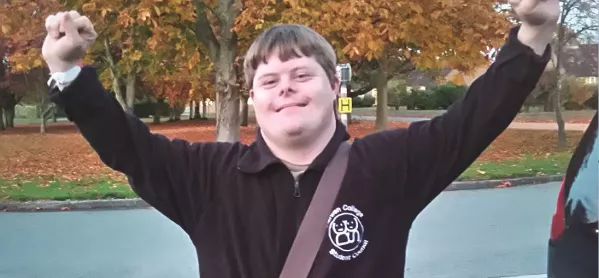How to give students with learning difficulties a voice
Share
How to give students with learning difficulties a voice
https://www.tes.com/magazine/archive/how-give-students-learning-difficulties-voice

Back in April 2015, Robin Ferguson, an FE learner studying for a traineeship at Derwen College, stood on stage at the NUS students’ union annual conference in front of a 1,000-strong audience.
His three-minute speech was punctuated by spontaneous applause from the crowd and when he finished, they responded with a standing ovation. Everyone in the audience was aware that they were watching a moment in history unfold before them.
The motion put forward at the conference by Derwen College, based in Shropshire, which Ferguson’s speech supported, called for greater equality of opportunity for students with learning difficulties and disabilities, for more consideration of accessibility in NUS communications and for the promotion, defence and extension of disability rights.
Ferguson’s address was all the more powerful because he has Down’s syndrome. He had worked on his speech and discussed the implications of leading the drive for change with the support of Sarah Laszlo, the college’s learner voice coordinator. She was watching from the wings on the day.
“It was the biggest moment of my working life,” she recalls. “I thought, ‘This is where it starts.’ This is the point where seeing someone on stage representing this group of learners, having a voice and being heard, ceases to be remarkable. This should be happening at every conference.”
Laszlo and her team had co-created training with the NUS to support people with learning difficulties and disabilities taking up NUS leadership roles. It was trialled within Derwen College’s vibrant student council. “This group of learners all have opinions,” she explains. “Why shouldn’t they have the same opportunity to voice them as their mainstream peers?”
The motion that led to Ferguson’s triumphant conference speech was passed unanimously. The positive change it sparked was instant and the solidarity palpable, Laszlo recalls. “It was empowering. We came out of there thinking, ‘We’re going to conquer the world.’”
Ferguson’s decisive call to action impressed and he was voted on to the NUS national committee. He explains: “2015 has been a year to remember for me personally. In 2016, I’m hoping to come back fighting and make history again.”
The secret behind his confidence, he adds, is knowing that there are trusted staff he can turn to if he needs help.
Sarah Simons works in FE colleges in the East Midlands. @MrsSarahSimons
This is an edited version of an article from the 8 January edition of TES.
Read the full coverage in this week’s TES magazine, available in all good newsagents. To download the digital edition, Android users can click here and iOS users can click here
Want to keep up with the latest education news and opinion? Follow TES on Twitter and like TES on Facebook
You've reached your limit of free articles this month. Subscribe for £1 per month for three months and get: